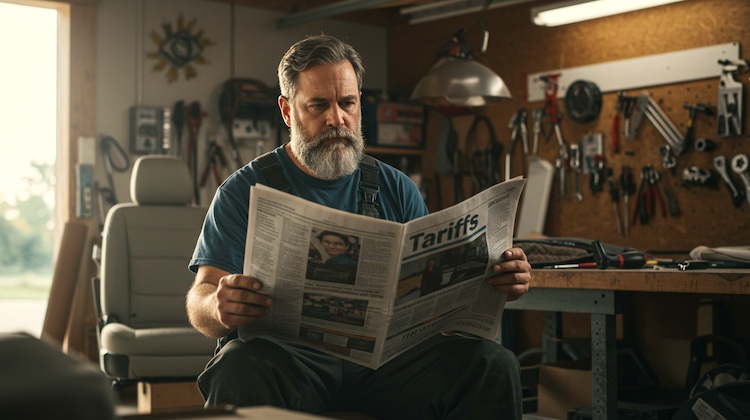
By now, you’ve probably seen the headlines: President Trump’s new 25% tariffs on imported automobiles and auto parts took effect April 3, and they’re already making waves across the automotive industry. But beyond the big manufacturers and dealerships, there’s another group feeling the squeeze — the small businesses that keep America’s cars looking sharp on the inside.
If you’re running an auto upholstery shop or a small mobile repair business, here’s what you need to know — and how these new policies could affect your bottom line.
What exactly is being taxed?
The new tariffs, announced via an official White House proclamation, apply broadly to imported vehicles and many foreign-made parts used in the automotive supply chain. That includes leather, synthetic fabrics, foam, adhesives, seat mechanisms, trim components — you name it. These are all items that auto upholstery shops depend on to repair, restore, and customize interiors.
According to the Auto Care Association, these tariffs could impact over $100 billion worth of automotive parts imported from countries like China, Mexico, and Canada — all common sourcing regions for the upholstery world.
What does that mean for small shops?
In plain terms: prices are going up.
Whether you’re ordering bulk rolls of vinyl, foam padding, or even thread and zippers from overseas suppliers, you’ll likely start seeing your material costs rise — possibly significantly — in the coming weeks and months.
And it’s not just about parts. These tariffs are causing ripple effects across the industry. Jaguar Land Rover, for example, has already paused shipments to the U.S. due to the uncertainty and rising costs. That means fewer new cars in the pipeline — and potentially less demand for high-end custom work tied to new vehicle deliveries.
Barely keeping up as is
Talk to any small shop owner and they’ll tell you: margins in this business are already tight. Unlike big collision shops or dealership-affiliated service centers, most independent upholsterers are solo operators or tight-knit crews working job-to-job.
As James Ramirez, who runs a two-man interior repair shop in Phoenix, put it:
“We don’t have the wiggle room to absorb a 20-30% increase in material costs. If thread or glue goes up five bucks, that’s annoying. But if a roll of marine-grade vinyl jumps $50 overnight? That’s a real hit.”
Many shops are now facing the tough choice of either raising their prices (and possibly losing customers) or eating the cost themselves.
Senator Ted Cruz raised a red flag too
Even politicians are starting to realize the unintended consequences. Senator Ted Cruz recently warned that the tariffs could raise the cost of all vehicles — not just imported ones — by an average of $4,500.
For upholstery businesses, that could mean fewer people buying new cars (less demand for upgrades or custom jobs) and more folks hanging onto older rides. That might sound good at first — older cars often need interior repairs — but if consumers are tightening their belts, even basic seat fixes might be postponed.
What can shop owners do now?
Here are a few smart ways to stay ahead of the curve:
1. Review your suppliers
If you’re importing directly or working with a U.S. distributor who sources overseas, ask how they expect to be impacted — and whether there are any domestic alternatives. Some companies are already shifting production to avoid tariff zones.
2. Consider strategic price adjustments
A small bump in prices — clearly explained to loyal customers — can help offset rising costs. Don’t apologize for passing along part of the burden. Most people understand.
3. Lean into repairs over custom work
As full-on restorations or high-end customization jobs take a back seat, offering fast, affordable repairs could bring in more volume.
4. Communicate transparently
Use your website or Instagram to explain why prices might change or materials might be delayed. Transparency builds trust — especially if you’re a local business with a loyal following.
It’s not all bad news
Despite the shake-up, there may be long-term opportunities for small, agile shops. If big companies start pulling out of the U.S. market or limiting imports, domestic upholstery pros with access to local materials and a good reputation could become more valuable than ever.
As always, it’ll come down to craftsmanship, customer relationships, and adaptability.
“This industry’s full of problem solvers,” Ramirez said. “We’ll find a way.”
Recent Comments